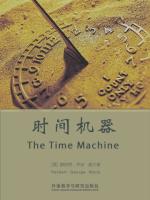The Time Machine
胡艺
"The Time Machine" is a groundbreaking novel that explores the
complexities of time travel and the profound implications it holds for
humanity. This novel, first published in 1895, remains as captivating
and thought-provoking today as it was more than a century ago. The
story follows the adventures of an unnamed narrator, a scientist who has
invented a time machine capable of transporting him to any era in
history. His curiosity leads him to embark on a journey into the future,
where he encounters both the wonders and horrors of a vastly altered
world. The narrator's first stop is in the year 802,701, where he finds
a world divided into two distinct races: the Eloi, a peaceful but feeble
humanoid species, and the Morlocks, a subterranean species that prey
upon the Eloi. This division serves as a poignant metaphor for the
potential dangers of societal evolution and the possible consequences of
technological progress unchecked. As the narrator delves deeper into
the future, he encounters even more startling changes. The Earth has
become a desolate and barren place, with most of its flora and fauna
having disappeared. The Eloi, once the dominant species, have become so
dependent on technology that they have lost their ability to survive
independently. This dependence highlights the danger of becoming too
reliant on advancements that can be easily taken away. The most
striking aspect of this novel, however, is Wells' ability to use the
concept of time travel as a tool for exploring the complexities of human
nature and the potential implications of technological progress. Through
the narrator's eyes, we see the dangers of unchecked progress, the
perils of societal division, and the fragility of our existence.
Overall, "The Time Machine" is a thought-provoking novel that
forces us to question our own place in the universe and the role that
technology plays in shaping our future. It is a timeless tale that
remains relevant and compelling in the modern era, serving as a reminder
of the importance of wisdom, compassion, and stewardship in guiding our
technological advancements.




 京公网安备 11010802032529号
京公网安备 11010802032529号